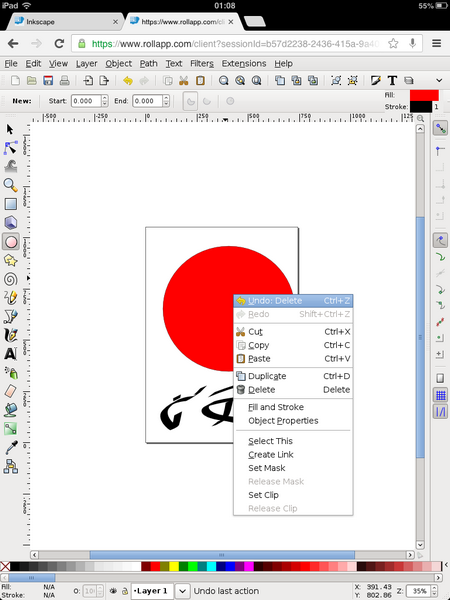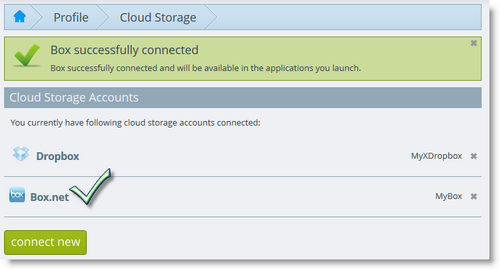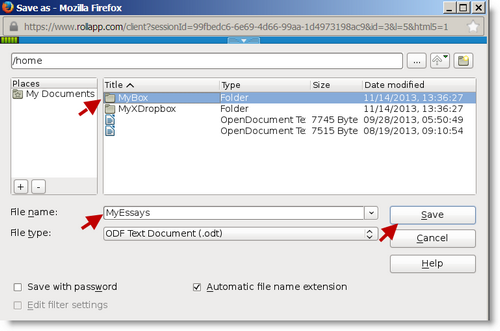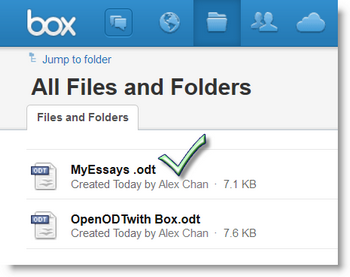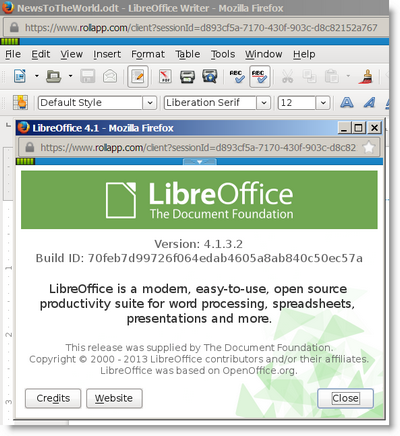
rollApp lets you run desktop apps, work with files, get things done — right from the browser on any device.
Cloud App of the Week: Inkscape for Vector Graphics on iPad and Chromebook
Browser-based Inkscape is an incredibly useful vector graphics editor available on rollApp’s cloud (enjoy drawing on iPad) and in the Chrome Web Store (perfect for Chromebook owners). It’s used in many different ways from creative art and web graphics to technical diagrams and navigation development.
If you are used to working with Adobe Illustrator or CorelDraw, Inkscape comes with similar capabilities and uses the Scalable Vector Graphics file format supporting many advanced SVG features: markers, clones, alpha blending.
Still, the application is more focused on popular vector graphics editing capabilities, including transparency, gradients, node editing, and pattern fills.
Inkscape stores its graphics in a vector format but it also can import and display bitmap images. For working with files – right through your browser – you’ll able to connect your rollApp account to Google Drive, Dropbox and Box.
The Inkscape developers are working on the new powerful version of Inkscape 0.49. Stay tuned!
Related posts:
Getting Started with Cloud Apps on Your Chromebook
So you’ve just bought a shiny new Chromebook: Samsung, Acer, or HP. Here’s a step-by-step guide of how to get up and running with cloud applications on rollApp.
1. Work online with office apps in Chrome
rollApp offers a suite of Chrome-based office apps that help you be more productive: OpenOffice and LibreOffice. As a rollApp user, you don’t need to install any software on your Chromebook. No downloading. Simply start working within the application in Google Chrome browser:
- Select an app and click Launch Online.
- You’ll be prompted to sign-in to rollApp – don’t freak out about this – we’ll make the App Collection work for you in the cloud.
- Use File > Save As to save your work. When you launch an online app on rollApp, you have several choices where your files will be saved or opened from: Dropbox, Box, or Google Drive. So you’ll need to connect cloud storage.
2. Open and edit any files directly in Chrome – just put them in your Dropbox first
- How to Save and Edit Cloud Files in rollApp
- How to Open an ODF OpenOffice File on Chromebook
- Alternatively, connect Box cloud storage to your rollApp account.
3. For a good housekeeping, use the Chrome App Launcher
4. Preview almost any file on the web – no software to install
We make it easy to view 100+ file types, including documents, ebooks, and archives directly in Google Chrome. Learn more: How to Use rollApp File Opener in the Chrome Toolbar
5. Be more productive using your browser
How to Instantly Preview Documents Online using rollApp File Opener
Alice Keeler, an adjunct professor of CSU Fresno, Microsoft Innovative Educator Trainer and Google Certified Teacher, recently posted an awesome series of articles about Google Chrome extensions that can help teachers in the classroom. And in the latest post – 5 Chrome Extensions for Teachers: Part 3 – she reviewed rollApp File Opener. Thanks for sharing, Alice, glad you liked it! Let us cross-post your findings here.
rollApp File Opener
I am constantly downloading resources from the web. Unfortunately, sometimes you have to download a resource before you can see if it is any good. You can view it of course after you figure out where the heck it downloaded to. RollApp does not fully solve this problem, but it is a huge help.
After installing the extension look for the little blue cloud icon near the omnibox. If a webpage has documents that can be downloaded you are able to click on this icon to reveal a list of all the documents that can be downloaded. In the below example I did a Google search for worksheets on the pythagorean theorem.
The @rollapp is kinda jaw dropping. Awesome.
— Alice Keeler (@alicekeeler) November 13, 2013
- Introducing rollApp File Opener in the Chrome Toolbar
- How to Save and Edit Cloud Files in rollApp
- 5 Chrome Extensions for Teachers – Part 1
- 5 Chrome Extensions for Teachers – Part 2
How to Connect Box Cloud Storage to Your rollApp Account
When you launch an online application on rollApp, you have several choices where your files will be saved or opened from. Box, an online file storage, is one of those choices.
Box allows you to store all kinds of files online and provides access to all your content, right in the browser. For a personal free account, Box offers 10GB secure storage with 250MB file upload size. Nice!
So if you’re a Box personal or enterprise user who considers working with the App Collection on rollApp, here’s how to get started:
Go to the Cloud Storage section of your account – rollapp.com/profile/storage – and click Connect New.
In the appeared drop-down list, select Box, change the default folder name if needed, and then click Connect.
You’ll redirected on Box.com where you need to log into your Box account. For this, enter your email and password, and click Log In.
Once done, you’ll redirected back to rollApp.com where you’ll see a congratulation message. And that’s pretty much it – your rollApp account can now work with the files you store in the Box’s cloud.
Now, if you need to save or open a file using an office or graphics app on rollApp, use the File > Save As menu command, name the file and indicate the path to your Box folder:
Related posts:
- How to Save and Edit Cloud Files in rollApp
- How to Open an ODF OpenOffice File on Chromebook
- Unable to View Files in Dropbox? Preview them with rollApp File Opener
LibreOffice 4.1.3 is Now Available in Your Browser: Chrome, Firefox or Safari
During the last couple of years, we’ve built a vibrant community of LibreOffice users on rollApp, including early adopters and power users. Today, we’re bringing the latest version of the LibreOffice online document management applications to rollApp platform.
What’s New in LibreOffice Version 4.1
The LibreOffice suite provides word processing, spreadsheets, slides and diagrams. The suite comes with a host of new features and several important improvements under the hood (you can get the full list in the release notes):
- Especially for migrations, LibreOffice adds a number of improvements of interoperability with MS Office formats, onluding .doc and .xls
- It’s now easy to include a series of photos in Impress with the “Photo Album” feature.
- Rotate images in Writer in 90 degree increments
- Send along your fonts with your documents. Writer, Calc and Impress now allow embedding fonts in their documents.
These browsed-based versions of LibreOffice apps extend access to your documents directly in Google Chrome, Mozilla Firefox and Safari. And this is a big deal for LibreOffice users, since you’ll no longer have to install it on your computer, laptop or Chromebook – rollApp will let you open your files and apps right in the browser. Here’s where to get started:
- LibreOffice Writer: rollapp.com/app/lowriter
- LibreOffice Calc: rollapp.com/app/localc
- LibreOffice Draw: rollapp.com/app/lodraw
- LibreOffice Impress: rollapp.com/app/loimpress
About LibreOffice
Did you know there’s a fascinating story behind LibreOffice, the free office suite?
Headquartered in Berlin, Germany, The Document Foundation and the LibreOffice project was forked from OpenOffice.org in 2010. In the same year, The Document Foundation was announced as the host of LibreOffice, a new derivative of OpenOffice.org.
The LibreOffice ecosystem continues to grow at a steady pace, with an average of over 100 active developers per month since February 2013. These figures tops the cumulative number of over 700 new developers attracted by the project since the announcement on September 28, 2010.
Between January 2011 (the first stable release) and October 2011, LibreOffice was downloaded approximately 7.5 million times. During 2012, the office suite was downloaded about 15 million times (source: Wikipedia).
Recently, the Spanish autonomous region of Valencia’s migration to LibreOffice on 120,000 PCs, which will save the government some 1.5 million Euro per year on proprietary software licenses.

